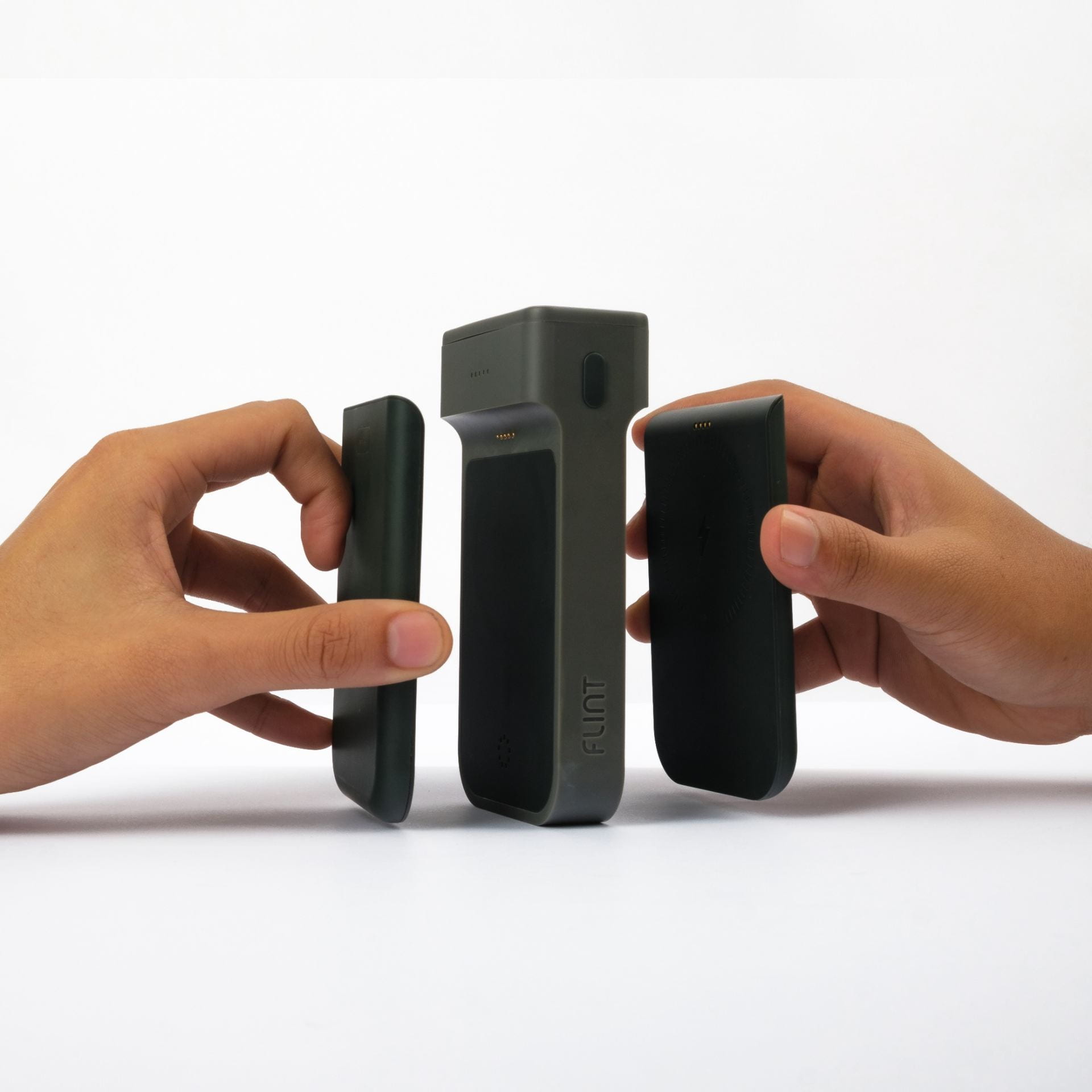Undergrad and serial innovator Carlo Charles is bringing an innovation from NTU’s labs to life with his NTU allies. And that’s just the tip of the iceberg for the man who’s on a mission to save the Earth
by Derek Rodriguez

The paper battery, a technology developed by NTU scientists, is a real game-changer and Carlo, an NTU undergrad, has plans to bring it to the world.
“When I first read about the paper batteries in an article, I couldn’t sleep the whole night. I kept thinking about its potential. So I searched for the study’s co-lead author Prof Fan Hongjin’s email and invited him to lunch the next day. We met and talked for several hours and realised that our values and visions were very similar,” says the second-year mechanical engineering student.
Soon after, the parties would sign a letter of intent, giving Carlo’s sustainable tech start-up, Flint, the go-ahead to commercialise, license, produce and bring paper batteries to market. Applications of the technology are seemingly endless, with its flexible nature promising a paradigm shift in how electronic gadgets are designed and its ability to be safely degraded a huge improvement over current lithium-ion batteries that are difficult to recycle.
Paper batteries won’t be Flint’s first product. Carlo’s company has already received over 1,000 orders for Flint Charge, a modular wireless charging system he built.
“We want to be as big as Apple and Google, for NTU and for Singapore. Then maybe I can be on the cover of HEY!,” he laughs.
Flint Charge, the company’s debut offering of a modular snap-on powerbank, is now in production.
PITCHING TO THE BIG GUNS FOR CHANGE
Carlo’s commitment to sustainability comes from what he experienced as a child in the Philippines before he moved to Singapore in his late teens and became a Singapore citizen.
He says: “I grew up in a place where we suffered from natural disasters like typhoons and flash floods. We saw our friends’ lives change overnight. They could be happy with their family one day and grieving the loss of someone or of their home the next. Can you imagine seeing your entire house fly away? It almost happened to us once too. We didn’t have water and electricity for a week and even got robbed. As I got more mature, I started to question why this was happening. When I learnt it was because of climate change, which is ultimately our doing, it just made no sense to me. I wanted to make a change and that’s when I started tinkering around.”
Carlo’s prototype for AquaLoop, an off-grid marine buoy that gathers and transmits relevant ocean data to the shore.
He joined Makerspace Manila, where he learnt not only innovative thinking and human-centric design, but a valuable lesson from its CEO – to not let his young age or anything else limit him. His first creation at 14, an air purifier made from recycled materials, cemented his passion for invention. Another at 16, a tiny device designed to bring light to people without electricity with just an antenna, caught the attention of National Geographic magazine.
And a week before he enlisted in National Service, he presented to Google and the US Embassy plans for a device to wirelessly study the results of climate change in oceans, securing their investments in it.
He has continued to pitch his ideas to the big guns, such as the United Nations and members of India’s Prime Minister’s office, opening doors for paper batteries to be tested in other countries.
CONNECTING WITH SUSTAINABILITY SOULMATES
At NTU, Carlo – and Flint – have an even bigger stage and more tools at his disposal to work towards his ambition of changing the world. He gets his hands dirty at the innovation labs on campus, such as Garage@EEE, the Mechanics of Materials Lab and labs at the School of Physical & Mathematical Sciences, and finds support through NTU faculty like Assoc Prof Andy Khong, Prof Ooi Kim Tiow and Assoc Prof David Fan.
The NTU DNA runs deep in Flint too. Its co-founder, Jeremy Wee, is a computer engineering graduate from NTU and its Chief Sustainability Officer is final-year materials science & engineering student Tan Shi Zhou, who is also a Global Sustainability Consultant at Razer and former President of Earthlink NTU. In Flint’s pipeline are plans to use the NTU Smart Campus as a testbed for future products.
“We are looking at introducing compostable bags to replace plastic bags on campus. But first we are speaking with vendors and analysing the bag’s life cycle to see if it is truly sustainable,” says Shi Zhou, who was involved in the development of the National Day Parade (NDP) pack in 2021.
Carlo adds: “NTU really supports student start-ups and is a playground for entrepreneurs like us. In NTU, things move fast and I can test ideas here to see if they work.”
Flint’s Chief Sustainability Officer, Shi Zhou (right), with prototypes of the 2021 NDP pack.
Though Flint is in talks with companies that include Airbus and Shell, the first application of paper batteries might be in NTU. Flint is planning a small-scale deployment of paper batteries to store excess energy generated by solar panels in the day for use at night.
STAYING ON COURSE
Although much of the start-up action happens outside of classrooms, NTU classes are also an integral part of the process.
Says Shi Zhou: “My minor in entrepreneurship has helped changed the way I think in terms of starting a business. I learnt what to take note of, how to engage stakeholders and how to ensure you can sustain your company. It also helps that the profs all have businesses and were able to share that experience with us. There are also useful modules in my core curriculum like environmental sustainability and materials, where I learnt how to analyse materials for their environmental impact, which is what I am doing now in Flint.”
Carlo adds: “I can take an elective if I need help in a particular area. I needed help with marketing last semester so I took a marketing module, where I learnt from real industry professionals. If you ask me what the three big growth areas are, it’s blockchain, artificial intelligence and sustainability, and the Interdisciplinary Collaborative Core modules cover all three. I feel it’s essential for students to know about these – in fact, I probably put more time into them than my core modules.”
This story was published in the Mar-Apr 2023 issue of HEY!. To read it and other stories from this issue in print, click here.




